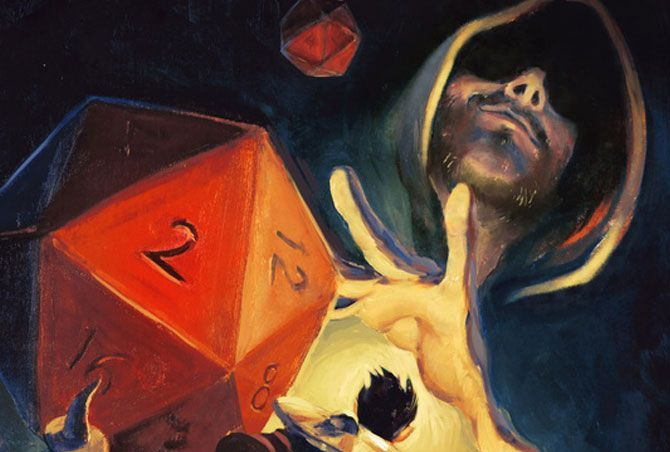Do you feel like every time your players talk to an NPC, they try to speed through it so they can get back to stabbing things until all the wet parts fall out? Are your cleverly crafted social encounters with full dialogue trees and subtle worldbuilding no more than speed bumps on their way to punching through bags of experience points? Is your political campaign teetering on the edge of boredom because all your NPCs are defeated by simple charisma checks? Well, no more! The Game Doctor is here to flex those speech muscles and put you on the path to social glory. Buckle up kids, we gun learn you to talk good!
Note: now that you’re all hyped up, most of this advice will be specific to D&D and Pathfinder. I’m most comfortable with Pathfinder, so I’ll be referring to skills and systems from that game, but translating them to other systems won’t be difficult.
Drop the Damn Dice

Rocks fall and everyone dies… of boredom.
The very first thing I suggest to amping up your social encounter is to roll WAY less. I’ve played in games where every single sentence was punctuated by a skill check, and those were terrible. Not only were they slow, but I often felt like the dice were doing all the roleplay for me. Not that there’s a problem with letting the dice do the talking. I think it’s important for the shy and socially challenged players to be given the opportunity to play a silver-tongued rapscallion, but at the same time you don’t want the talky-bits to be nothing more than a numbers game.
Establish right away that your players don’t get to roll diplomacy, bluff, or intimidate until you call for it. Depending on what they’re saying or asking of the NPC, they may simply auto-succeed because their requests align with the NPC’s goals already, or perhaps the party is trying to spin a tale that the NPC already believes or is more than happy to. By the same token, their request may be so far beyond the pale that no amount of silver-tongued shenanigans will convince them. What I generally do is call for a check when I feel like the NPC would have a hard time believing or going along with what the players are saying, and end the encounter based on how well I feel the players did overall instead of a pass-or-fail roll. I also try to keep in mind when a failed check might cause the encounter and the adventure to grind to a halt if a critical piece of information or assistance is in the balance.
Charisma checks are not mind control. A 30+ Diplomacy result doesn’t convince the king to hand over the princess to be ritually sacrificed, or cause the shopkeep to part with his prized +5 Holy Avenger Longsword. Another thing to keep in mind is what to do when your players are trigger-happy with their Sense Motive/Insight. If every bit of information is followed up by the players suspecting foul play, it may be that you are lying too often, or your NPCs are being too stingy with their confessions. Not every encounter needs to turn into a Sherlock Holmes style interrogation.
Along that line of thinking, a good tool to use while getting used to the idea of NPCs being more or less willing to part with information is to write down a few “social encounter statistics”. I tend to focus on how forthcoming, how willing they are do divulge information, helpful, how willing they are to lend services, aid, or resources, and suspicious, how willing they are to believe a story or to take things at face value. For example, a barkeep will likely be very forthcoming with rumors and gossip to keep people drinking, not especially helpful because he has a business to run, and moderately suspicious, because he’s familiar with the usual cons, but he doesn’t make enough money to be a target very often. A revolutionary will likely be not at all forthcoming and incredibly suspicious, but very helpful if they believe the players are going to further their cause.
Death to Charisma!

Everyone knows Dexterity is the new Charisma.
One hallmark of a lackluster social encounter is the over-reliance on Charisma and Charisma skills to resolve it. While they do seem like the go-to skills when talking to someone, overdoing them will put far too much focus on Charisma-based characters (ie. the “Party Face”) and prevent those who just happen to have a character class without Charisma from participating in social encounters. You won’t be able to effectively control spotlight when only a single character’s skills are relevant to the situation. Imagine a dungeon designed in such a way that the only way to progress was by picking locks, balancing on beams, and dodging traps. Dexterity-based characters would hog all the spotlight to the detriment of everyone who just happens to wear fullplate.
But Doctor, if not Charisma, what else?
Hold up there. Charisma will always play a part in social encounters. Whether you’re trying to exert influence over a stubborn guard or convince someone you’re The Great Juandeneros, Hero of Fakelandia, Charisma is going to be a key component in those situations. However, what most DMs and players do is zero in on those handful of Charisma skills and ignore everything else that can contribute to a social encounter. Let’s zoom out a tad.
Why Can’t I Hold All These Skills?!
Depending on the game you’re playing, there’s more than likely a vast array of skills available to spice up a social encounter.
The first is your wisdom checks. Sense Motive/Insight have a lot more uses than to simply detect falsehoods. Limiting yourself that way is like owning a Swiss Army knife and only ever using the corkscrew! Instead, you can use Insight to drop much more subtle hints to your players about the encounter that you’d otherwise have to spell out in detail. For example, let’s say a guard is feigning ignorance about a secret entrance. After calling for an insight roll, you can follow up a success with “he’s lying” or you can say something like “The moment he denies knowledge of the entrance, you see his eyes flicker over to a spot on the wall for a fraction of a second before focusing back on you.” Now you get to skip all the minutia of interrogating someone the players think is being deceptive (like normal people, right?). Perception can also be used to give your players more information that might have escaped their notice at first glance that they can use in the negotiations.
Another simple skill to bring into the fold is a basic knowledge check. You can call for a roll to recall information relevant to the topic you’re discussing, to learn something about the person you’re talking to, or even for specific information they can use to gain leverage. This allows you to include those without Charisma to participate in social encounters to a greater degree by providing relevant assistance.
But we’re not done zooming out yet! I saved the best for last, because this particular technique has saved my bacon with impromptu social encounters many many times.
Inception

It’s time to bust out that coil scribbler. We’re going to make a list!
Well, maybe I undersold it a bit. When I said we’re going to zoom out, I mean we’re going to zoom out to the players’ entire character sheets and beyond. Literally every single skill, class ability, racial feature, feat, and even gear can be turned into a beacon for you to shine your spotlight on a player in a social encounter. That goes triple for anything in their backstory you can make relevant to the scene. For each of your characters, pick 5 things from their character sheet and backstory at random. Take each of those things and turn it into a roleplay hook that you can use to get them involved in a scene where they may normally be inclined to sit it out. Here’s a few examples if you have trouble imagining what I mean:
“As the barkeep leans forward to give you an intimidating scowl, you notice a heavy medal tucked into his tunic. You recognize it as a medal your Dwarven clan bestows upon outsiders who have shown themselves to be allies.”
In this case, the medal was given to the barkeep’s grandfather, who showed great courage and pragmatism in the defense of the stronghold against an Orcish attack during a trade mission. Bringing this up, followed by a history check (that the dwarf gets a bonus on) would build rapport and give the players’ a relevant reward.
“A long scar runs up the forearm and disappears into the guard’s breastplate. Because of your Goblin Favored Enemy, you recognize it as a wound delivered by a dogslicer.”
The Ranger can now bring up the injury, and receive a bonus if they’re able to relate the goal of the social encounter to goblins in some way.
“The stoic guide regards you with distaste and responds with little more than a dismissive grunt. However, you recognize the decorated saber mounted on the wall behind him as a weapon used in diplomatic sword-dance rituals between himself and other peoples of the desert. Your falchion is very similar to this saber, and you are familiar with the ritual.”
This would prompt the falchion-wielding character to initiate this diplomatic ritual and use his Strength and Dexterity scores as substitutes for Charisma.
The best thing about these sort of incepted bits of information is they can be slotted into ANY social encounter and onto practically any NPC. When the min-max’d, Charisma dumped, faceless murderhobo barbarian starts fiddling with his phone because there’s talky-parts before the next wet bag of experience points, you can drop one of these and immediately bring them back into the fold and remind them that their stat block isn’t a substitute for a backstory.
Social Encounters are nothing to fear, and are more than just filler between fights. Try to not rely too much on Charisma, but don’t leave it out altogether. Use pieces of your players’ character sheets to hook them into social encounters when they’d normally be left out by the party face. This is the part where I ask for audience participation and compel you, the reader, to take a detail from one of your campaign’s characters and turn it into a roleplay hook and post it below.

Super helpful, will have to reread many times, I’m afraid.
LikeLike
[…] 3 of you), this may seem somewhat familiar. That’s because I’ve decided to rewrite my last article titled “Why your social encounters suck and how to make them great”. Though I may seem […]
LikeLike